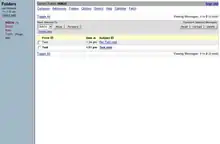SquirrelMail
SquirrelMail is a project that aims to provide both a web-based email client and a proxy server for the IMAP protocol.
 Screenshot of the SquirrelMail message view | |
| Original author(s) | Nathan and Luke Ehresman[1] |
|---|---|
| Developer(s) | The SquirrelMail Project Team |
| Stable release | |
| Repository | https://sourceforge.net/projects/squirrelmail/ |
| Written in | PHP |
| Platform | Web platform |
| Available in | 56 languages[4] |
List of languages Arabic, Bahasa Indonesia, Bahasa Melayu, Bangladeshi Bengali, Basque, Brazilian Portuguese, British, Bulgarian, Catalan, Chinese Simplified, Chinese Traditional, Croatian, Czech, Danish, Dutch, Estonian, Faroese, Finnish, French, Frisian, Georgian, German, Greek, Hebrew, Hungarian, Icelandic, Indian Bengali, Italian, Japanese, Khmer, Korean, Latvian, Lithuanian, Macedonian, Norwegian Bokmål, Norwegian Nynorsk, Persian, Polish, Portuguese, Romanian, Russian, Russian Ukrainian, Serbian, Sinhala, Slovak, Slovenian, Spanish, Swedish, Tagalog, Tamil, Thai, Turkish, Uighur, Ukrainian, Vietnamese, Welsh | |
| Type | Webmail |
| License | GPL-2.0-or-later |
| Website | www |
The latest stable version 1.4.23-svn is tested with PHP up to version 8.1 and replaces version 1.4.22 which can only run on PHP version 5.0-5.4. The svn part in the version name points out that bugfixes and minor improvements are no longer published as new versions, but instead are maintained within Apache Subversion version control system.
History
The webmail portion of the project was started by Nathan and Luke Ehresman[1] in 1999 and is written in PHP. SquirrelMail can be employed in conjunction with a LAMP "stack", and any other operating systems that support PHP are supported as well. The web server needs access to the IMAP server hosting the email and to an SMTP server to be able to send mails.[5]
SquirrelMail webmail outputs valid HTML 4.0 for its presentation, making it compatible with a majority of current web browsers. SquirrelMail webmail uses a plugin architecture to accommodate additional features around the core application, and over 200 plugins are available on the SquirrelMail website.[6]
The SquirrelMail IMAP proxy server product was created in 2002 by Dave McMurtrie while at the University of Pittsburgh (where it was named "up-imapproxy", although it has become more commonly known as "imapproxy") and adopted by the SquirrelMail team in 2010.[7] It is written in C and is primarily made to provide stateful connections for stateless webmail client software to an IMAP server, thus avoiding new IMAP logins for every client action and in some cases significantly improving webmail performance.
Both SquirrelMail products are free and open-source software subject to the terms of the GNU General Public License version 2 or any later version.
SquirrelMail webmail was included in the repositories of many major Linux distributions[8][9][10][11][12][13][14][15][16] and is independently downloaded by thousands of people every month.[17]
Platforms
SquirrelMail webmail is available for any platform supporting PHP. Most commonly used platforms include Linux, FreeBSD, macOS and the server variants of Microsoft Windows. SquirrelMail IMAP Proxy compiles on most flavors of Unix, and can generally be used on the same platforms that the webmail product can with the exception of Microsoft Windows, unless used in a Cygwin or similar environment. Apple shipped SquirrelMail as their supported web mail solution in Mac OS X Server.[18]
Plugins
The SquirrelMail webmail client itself is a complete webmail system, but extra features are available in the form of plugins. There are over 200 third-party plugins available for download from the SquirrelMail website and SquirrelMail ships with several "standard" or "core" plugins.
Internationalization
SquirrelMail webmail has been translated into over 50 languages including Arabic, Chinese, French, German, and Spanish.[4]
Notable installations
SquirrelMail has been implemented as the official email system of the Prime Minister's Office of the Republic of India for its security advantages over Microsoft's Outlook Express.[19][20][21][22]
In 2004 HEC Montréal business school deployed SquirrelMail as part of a comprehensive webmail solution, to support thousands of users.[23]
References
- "SquirrelMail history". Squirrelmail.org. Retrieved 11 August 2009.
- "SquirrelMail Downloads". Retrieved 19 November 2020.
- Error: Unable to display the reference properly. See the documentation for details.
- "SquirrelMail translation statistics". L10n-stats.squirrelmail.org. 16 June 2009. Retrieved 11 August 2009.
- "SquirrelMail, a Web-Based Mail Server – O'Reilly Media". onlamp.com. Archived from the original on 25 July 2010. Retrieved 29 July 2010.
- Wallen, Jack (7 August 2007). "SolutionBase: Taking SquirrelMail to new levels". Articles.techrepublic.com.com. Archived from the original on 31 December 2009. Retrieved 31 October 2010.
- "IMAP Proxy home page". Retrieved 15 November 2010.
- "Fedora Package Database – squirrelmail". fedoraproject.org. Archived from the original on 20 December 2012. Retrieved 6 March 2010.
- "Novell: openSUSE 10.3: squirrelmail". novell.com. Archived from the original on 11 April 2011. Retrieved 6 March 2010.
- "Debian – Package Search Results – squirrelmail". debian.org. Retrieved 6 March 2010.
- "CentOS Package List". centos.org. Archived from the original on 9 March 2010. Retrieved 6 March 2010.
- "CentOS SquirrelMail Package". centos.org. Retrieved 6 March 2010.
- "Ubuntu – Package Search Results – squirrelmail". ubuntu.com. Retrieved 6 March 2010.
- "Gentoo Packages /package/mail-client/squirrelmail". gentoo.org. Archived from the original on 26 September 2010. Retrieved 6 March 2010.
- "FreeBSD Ports Search – squirrelmail". freebsd.org. Retrieved 6 March 2010.
- "Port description for mail/squirrelmail". freebsd.org. Archived from the original on 10 September 2012. Retrieved 6 March 2010.
- "Project Statistics for SquirrelMail". sourceforge.net. Retrieved 25 July 2018.
- "Peachpit: Mac OS X Server Mail Service Boot Camp: Advanced Mailing List Features and Web Mail". 13 October 2006. Retrieved 30 August 2010.
- "Microsoft dumped after India PM's emails go AWOL". The Register. 17 March 2009. Retrieved 6 March 2010.
- "PMO's email system infected for three months". The Times of India. 15 March 2009. Archived from the original on 11 August 2011. Retrieved 6 March 2010.
- "Indian PM Abandons Outlook for Open-Source Email". infopackets.com. 20 March 2009. Retrieved 6 March 2010.
- "No Microsoft mail for PM". techgoss.com. 16 March 2009. Retrieved 6 March 2010.
- "HEC Montréal: Deployment of a Large-Scale Mail Installation". linuxjournal.com. 1 May 2004. Retrieved 25 July 2010.